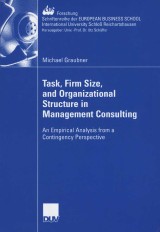Details

Task, Firm Size, and 0rganizational Structure in Management Consulting
An Empirical Analysis from a Contingengy Perspectiveebs-Forschung, Schriftenreihe der EUROPEAN BUSINESS SCHOOL Schloß Reichartshausen, Band 63
|
53,49 € |
|
| Verlag: | Deutscher Universitätsverlag |
| Format: | |
| Veröffentl.: | 06.11.2007 |
| ISBN/EAN: | 9783835093362 |
| Sprache: | englisch |
| Anzahl Seiten: | 335 |
Dieses eBook enthält ein Wasserzeichen.
Beschreibungen
Foreword The management consulting industry has grown into a sizeable eco nomic sector and employment market in the outgoing 20* century. Globally operating management consulting firms, with thousands of consultants, have emerged. They coexist alongside many small consultancies and single practi tioners. As a result, a remarkable diversity in the organizational structure of management consulting firms has developed. Organizational structure is of utmost importance for consultancies as it directly impacts their business and employment models. Yet, little scientific explanation has been offered so far on the factors accounting for the diversity of organizational structure in manage ment consulting. Michael Graubner explores this contemporary topic. His research is guided by the contingency theory of organizations, one of the classical organi zation theory schools of thought that has been traditionally applied to investi gate organizational structure in manufacturing, banking, and the public sector. The author thoroughly reviews the different aspects of contingency theor- contingency factors, constructs of organizational structure, the concept of fit between contingencies and structure, organic vs. bureaucratic theory - and reflects on them in the light of other organization theory schools of thought.
Theory.- Methodology.- Results.- Discussion.- Conclusion.
Dr. Michael Graubner promovierte bei Prof. Dr. Jean-Paul Thommen am Lehrstuhl für Allgemeine Betriebswirtschaftslehre, mit den Schwerpunkten Organisation und Personal der European Business School, Oestich-Winkel. Er ist derzeit als Unternehmensberater für McKinsey & Co. in Berlin tätig.<br>
<br>
<br>
The management consulting industry has grown into a sizeable economic sector and employment market. Globally operating consulting firms, with thousands of consultants, have emerged. They coexist alongside many small consultancies and single practitioners. As a result, a remarkable diversity in the organizational structure of consulting firms has developed. Organizational structure is of utmost importance for consultancies as it directly impacts their business and employment models. Yet, little scientific explanation has been offered so far on the factors accounting for the diversity of organizational structure in management consulting.<br>
<br>
Michael Graubner uses the contingency theory of organizations to investigate consultancies' organizational structure in terms of structural differentiation, specialization, centralization, and formalization. He analyzes extensive qualitative and quantitative data obtained during a series of personal interviews in consulting firms with offices in Germany, Austria, and Switzerland. The results show that organizational size and to a lesser degree task uncertainty are closely associated with organizational structure. <br>
<br>
<br>
Michael Graubner uses the contingency theory of organizations to investigate consultancies' organizational structure in terms of structural differentiation, specialization, centralization, and formalization. He analyzes extensive qualitative and quantitative data obtained during a series of personal interviews in consulting firms with offices in Germany, Austria, and Switzerland. The results show that organizational size and to a lesser degree task uncertainty are closely associated with organizational structure. <br>
<br>
The management consulting industry has grown into a sizeable economic sector and employment market. Globally operating consulting firms, with thousands of consultants, have emerged. They coexist alongside many small consultancies and single practitioners. As a result, a remarkable diversity in the organizational structure of consulting firms has developed. Organizational structure is of utmost importance for consultancies as it directly impacts their business and employment models. Yet, little scientific explanation has been offered so far on the factors accounting for the diversity of organizational structure in management consulting.<br>
<br>
Michael Graubner uses the contingency theory of organizations to investigate consultancies' organizational structure in terms of structural differentiation, specialization, centralization, and formalization. He analyzes extensive qualitative and quantitative data obtained during a series of personal interviews in consulting firms with offices in Germany, Austria, and Switzerland. The results show that organizational size and to a lesser degree task uncertainty are closely associated with organizational structure. <br>
<br>
<br>
Michael Graubner uses the contingency theory of organizations to investigate consultancies' organizational structure in terms of structural differentiation, specialization, centralization, and formalization. He analyzes extensive qualitative and quantitative data obtained during a series of personal interviews in consulting firms with offices in Germany, Austria, and Switzerland. The results show that organizational size and to a lesser degree task uncertainty are closely associated with organizational structure. <br>
<br>


















